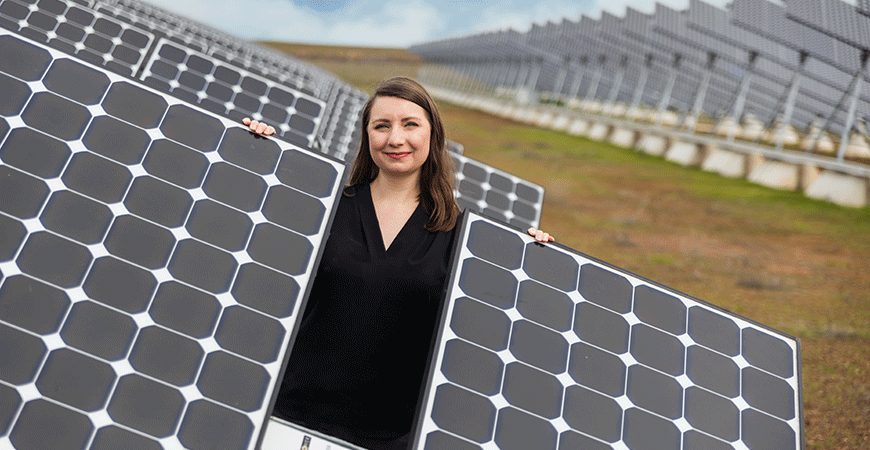
Civil and Environmental Engineering Professor Marie-Odile Fortier’s plan to make more accurate assessments of renewable energy systems’ carbon footprints has made her the fifth UC Merced recipient of the prestigious CAREER award this year.
The award comes from the National Science Foundation (NSF), which gives the grants to encourage early-career researchers.
Fortier is the 28th UC Merced researcher to earn the grant, and the second from the School of Engineering this year. CAREER awards are given through the Faculty Early Career Development Program to recognize untenured faculty members as teacher-scholars. Early-career faculty members are selected based on three factors: the strength of their research proposals; their potential to serve as academic role models in research and education; and their leadership in their field and organizations.
“We hypothesize that we have been giving ourselves more credit than we’re due when it comes to carbon emissions reductions with renewable energy,” Fortier said.
Fortier will receive $500,000 over the next five years for her project “Geospatial Life Cycle Climate Change Impacts of Solar and Ocean Renewable Energy Systems.”
Carbon footprints are calculated by aggregating the greenhouse gas emissions during an energy system’s entire life cycle, from raw material extraction and manufacturing through disposal, and dividing that by the amount of electricity it generates during its lifetime. When figuring out how much of a climate change mitigation benefit a renewable energy system offers, people often overlook many of the factors that can dramatically change — and even negate — the system’s benefits relative to the fossil fuels it aims to replace.
“Renewable energy systems harness energy from nature, so it only makes sense that geographic variations in the natural resource they transform into electricity can make a difference. For example, all the solar panels in an installation have the same environmental impacts from their manufacturing and their end of life,” she said. “But if some are facing a wall, they are not harvesting the same amount of energy from the sun. That means the panels facing the wall would have a larger carbon footprint.”
Fortier and her lab will first update baseline comparisons to fossil fuels by including direct land use and albedo changes to their carbon footprints. Albedo change, or changing the surface reflectivity of the land, is another way that humans are contributing to climate change in addition to greenhouse gas emissions. The lab will incorporate geospatial factors, direct land-use change impacts and albedo change impacts in assessing both emerging and established ocean and solar energy systems.
The researchers plan to provide data for people who make decisions about renewable energy systems — including where and when they should be used — to help avoid “greenwashing” — making something appear “green” or sustainable when it isn’t. Some of the novel systems Fortier and her students will investigate will be just at the brink of wide use, such as floating solar photovoltaic systems, tidal turbines, and wave power systems. More accurate assessments could inform sustainable location-specific design, siting and implementation decisions for the country’s green-energy transition.
“We have to take geospatial data into account, or we might be overestimating carbon emissions reductions,” she said.
Fortier has been with UC Merced since 2018. She is affiliated with the Sierra Nevada Research Institute and two School of Engineering graduate groups:Environmental Systems and Mechanical Engineering.
Each CAREER award proposal includes an educational outreach component, and Fortier’s award will help her develop a new geospatial life cycle assessment course. It will also support more training for underrepresented undergraduate engineering students and provide a pathway to graduate studies along the same line of research.
“I am happy to see that the NSF recognized Marie-Odile's novel and exciting ideas, and I look forward to seeing her approaches and outcomes become part of our curriculum,” department Chair Professor Tom Harmon said.
Fortier’s students will help analyze GIS datasets and satellite data and develop geographically sensitive models of the life cycle climate change impacts of renewable energy systems. They will also participate in developing workshops, an informational website, instructional videos and an interactive map of location-specific results, in addition to the research and data analysis.
Fortier said she was elated to receive the CAREER award.
“This is my dream project, and to have this path to guide our country’s energy transition toward minimizing its impacts on climate change makes it even more exciting,” she said.



